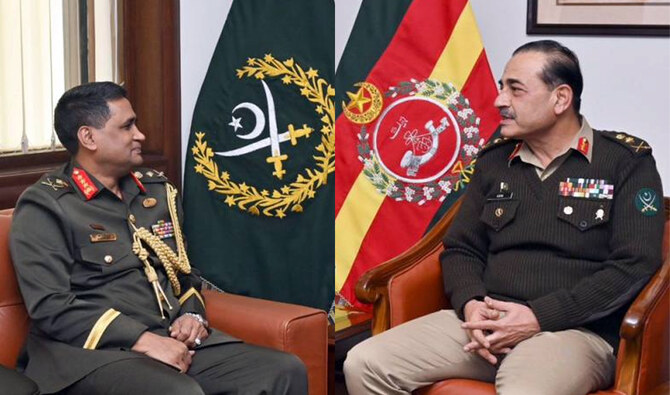QUETTA: In the sparsely populated stretches of Sibi, a city 160 kilometers from Quetta in the arid expanse of Pakistan’s southwestern Balochistan province, the steady hum of sewing machines cut through the din of a busy marketplace earlier this month.
Behind one sewing machine sat 32-year-old Sanaullah Marri, who has over two decades of experience making Baloch waistcoats, a must-have in male wardrobes around the year but especially popular during celebrations of religious holidays like Eid Al-Fitr.
Surrounded by colorful fabrics and threads spread out on the floor around him, Marri was working overtime to complete a long list of orders ahead of the Eid holiday.
The young tailor has earned the reputation of a specialist, with people arriving from nearby cities to order the famous Baloch waistcoat he crafts, locally known as “Marri Jabb.”
“Majority of the tribesmen in Balochistan prefer to wear this cultural dress on Eid and other festivals like the annual Baloch Culture Day,” Marri told Arab News. “Among the traditional waistcoat designs, the Marri cut is very popular among local tribes.”
In Quetta, the provincial capital, thousands of men thronged to the Moti Ram and Jinnah Roads ahead of Eid to select waistcoats to complement their dresses, which include turbans, sandals and baggy shalwar kameez.
“Being a Baloch, it is a must for me to keep alive and wear my traditional attire on the three days of Eid celebrations,” said 20-year-old Muhammad Asif, who resides in Kalat district but was visiting Quetta for Eid shopping with friends.
Jameel-ur-Rehman, a waistcoat seller in Quetta for four decades, said the demand for Marri and Baloch designs spiked during the Eid festivals.
“We have hired craftsmen in Sibi, Kohlu and Kharan districts, famous for making these traditional waistcoats, who take our orders and prepare these waistcoats according to the given designs,” he said.
“A high-quality waistcoat with additional embroidery and beads can cost up to Rs10,000 [$36], but the normal ones available in the market for everyone are between Rs2000-5000 [$8-18].”
Rehman said different colors were used in different types of waistcoats but the Marri designed used only one thread.
“Only one thread is used which is white or the matching color of the waistcoat is used,” he said.
“These are all handmade, made with a lot of effort. Machinery designs don’t sell here and people also prefer only handmade designs.”
This was true for Sarfaraz Ahmed, a 32-year-old local customer visiting Rehman’s shop to buy a tailored waistcoat to match his Eid outfit.
“Baloch waistcoat designs change slightly with the cultural and tribal differences of people living in Kharan, Sarawan, Jhalawan and Rakshan areas,” he said.
“I found this [waistcoat] very unique and had it made to match the clothes I just got tailored for Eid,” Ahmed said as he showed the embroidery on a blue vest he had selected.
“And idea is that this time on Eid, I want to express happiness through colors.”
In southwest Pakistan, colorful hand embroidered waistcoats a must-have in Eid wardrobes
https://arab.news/53shp
In southwest Pakistan, colorful hand embroidered waistcoats a must-have in Eid wardrobes

- Crafted with colorful threads, Balochistan’s most famous waistcoat is locally known as ‘Marri Jabb’
- Waistcoat sales boom ahead of Eid Al-Fitr as customers flock to markets to match vests with outfits
















